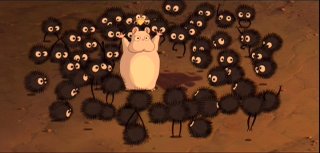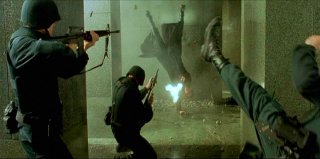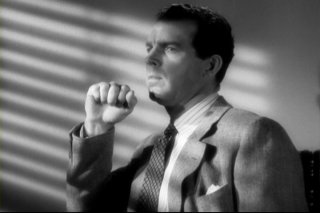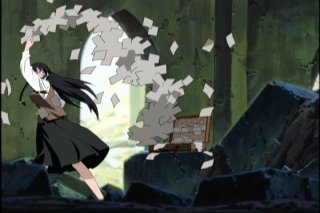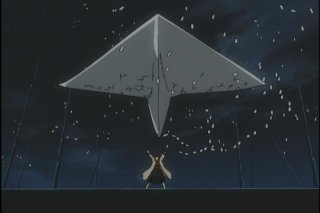A few weeks ago, I wrote about how context matters when consuming art. As sometimes happens when writing an entry, that one got away from me and I never got around to the point I originally started with (that entry was originally entitled “Referential” but I changed it when I realized that I wasn’t going to write anything about references), which was how much of our entertainment these days references its predecessors. This takes many forms, some overt (homages, parody), some a little more subtle.
I originally started thinking about this while watching an episode of Family Guy. The show is infamous for its random cutaway gags – little vignettes that have no connection to the story, but which often make some obscure reference to pop culture. For some reason, I started thinking about what it would be like to watch an episode of Family Guy with someone from, let’s say, the 17th century. Let’s further speculate that this person isn’t a blithering idiot, but perhaps a member of the Royal Society or something (i.e. a bright fellow).
This would naturally be something of a challenge. There are some technical explanations that would be necessary. For example, we’d have to explain electricty, cable networks, signal processing and how the television works (which at least involves discussions on light and color). The concept of an animated show, at least, would probably be easy to explain (but it would involve a discussion of how the human eye works, to a degree).
There’s more to it, of course, but moving past all that, once we start watching the show, we’re going to have to explain why we’re laughing at pretty much all of the jokes. Again, most of the jokes are simply references and parodies of other pieces of pop culture. Watching an episode of Family Guy with Isaac Newton (to pick a prominent Royal Society member) would necessitate a pause just about every minute to explain what each reference was from and why Family Guy’s take on it made me laugh. Then there’s the fact that Family Guy rarely has any sort of redeemable lesson and often deliberately skews towards actively encouraging evil (something along the lines of “I think the important thing to remember is that it’s ok to lie, so long as you don’t get caught.” I don’t think that exact line is in an episode, but it could be.) This works fine for us, as we’re so steeped in popular culture that we get the fact that Family Guy is just lampooning of the notion that we could learn important life lessions via a half-hour sitcom. But I’m sure Isaac Newton would be appalled.
For some reason, I find this fascinating, and try to imagine how I would explain various jokes. For instance, the episode I was watching featured a joke concerning “cool side of the pillow.” They cut to a scene in bed where Peter flips over the pillow and sees Billy Dee Williams’ face, which proceeds to give a speech about how cool this side of the pillow is, ending with “Works every time.” This joke alone would require a whole digression into Star Wars and how most of the stars of that series struggled to overcome their typecasting and couldn’t find a lot of good work, so people like Billy Dee Williams ended up doing commercials for a malt liquor named Colt 45, which had these really cheesy commercials where Billy Dee talked like that. And so on. It could probably take an hour before my guest would even come close to understanding the context of the joke (I’m not even touching the tip of the iceberg with this post).
And the irony of this whole thing is that jokes that are explained simply aren’t funny. To be honest, I’m not even sure why I find these simple gags funny (that, of course, is the joy of humor – you don’t usually have to understand it or think about it, you just laugh). Seriously, why is it funny when Family Guy blatantly references some classic movie or show? Again, I’m not sure, but that sort of humor has been steadily growing over the past 30 years or so.
Not all comedies are that blatant about their referential humor though (indeed, Family Guy itself doesn’t solely rely upon such references). A recent example of a good referential film is Shaun of the Dead, which somewhow manages to be both a parody and an example of a good zombie movie. It pays homage to all the classic zombie films and it also makes fun of other genres (notably the romantic comedy), but in doing so, the filmmakers have also made a good zombie movie in itself. The filmmakers have recently released a new film called Hot Fuzz, which attempts the same trick for action movies and buddy comedies. It is, perhaps, not as successful as Shaun, but the sheer number of references in the film is astounding. There are the obvious and explicit ones like Point Break and Bad Boys II, but there are also tons of subtle homages that I’d wager most people wouldn’t get. For instance, when Simon Pegg yells in the movie, he’s doing a pitch perfect impersonation of Arnold Schwarzenegger in Predator. And when he chases after a criminal, he imitates the way Robert Patrick’s T-1000 runs from Terminator 2.
References don’t need to be part of a comedy either (though comedies seem to make the easiest examples). Hop on IMDB and go to just about any recent movie, and click on the “Movie Connections” link in the left navigation. For instance, did you know that the aformentioned T2 references The Wizard of Oz and The Killing, amongst dozens of other references? Most of the time, these references are really difficult to pick out, especially when you’re viewing a foreign film or show that’s pulling from a different cultural background. References don’t have to be story or character based – they can be the way a scene is composed or the way the lighting is set (i.e. the Venetian blinds in Noir films).
Now, this doesn’t just apply to art either. A lot of common knowledge in today’s world is referential. Most formal writing includes references and bibliographies, for instance, and a non-fiction book will often assume basic familiarity with a subject. When I was in school, I was always annoyed at the amount of rote memorization they made us do. Why memorize it if I could just look it up? Shouldn’t you be focusing on my critical thinking skills instead of making me memorize arbitrary lists of facts? Sometimes this complaining was probably warranted, but most of it wasn’t. So much of what we do in today’s world requires a well-rounded familiarity with a large number of subjects (including history, science, culture, amongst many other things). There simply isn’t any substitute for actual knowledge. Though it was a pain at the time, I’m glad emphasis was put on memorization during my education. A while back, David Foster noted that schools are actually moving away from this, and makes several important distinctions. He takes an example of a song:
Jakob Dylan has a song that includes the following lines:
Cupid, don’t draw back your bow
Sam Cooke didn’t know what I know
Think of how much you need to know in order to understand these two simple lines:
1)You need to know that, in mythology, Cupid symbolizes love
2)And that Cupid’s chosen instrument is the bow and arrow
3)Also that there was a singer/songwriter named Sam Cooke
4)And that he had a song called which included the lines “Cupid, draw back your bow.”
… “Progressive” educators, loudly and in large numbers, insist that students should be taught “thinking skills” as opposed to memorization. But consider: If it’s not possible to understand a couple of lines from a popular song without knowing by heart the references to which it alludes–without memorizing them–what chance is there for understanding medieval history, or modern physics, without having a ready grasp of the topics which these disciplines reference?
And also consider: in the Dylan case, it’s not just what you need to know to appreciate the song. It’s what Dylan needed to know to create it in the first place. Had he not already had the reference points–Cupid, the bow and arrow, the Sam Cooke song–in his head, there’s no way he would have been able to create his own lines. The idea that he could have just “looked them up,” which educators often suggest is the way to deal with factual knowledge, would be ludicrous in this context. And it would also be ludicrous in the context of creating new ideas about history or physics.
As Foster notes, this doesn’t mean that “thinking skills” are unimportant, just that knowledge is important too. You need to have a quality data set in order to use those “thinking skills” effectively.
Human beings tend to leverage knowledge to create new knowledge. This has a lot of implications, one of which is intellectual property law. Giving limited copyright to intellectual property is important, because the data in that property eventually becomes available for all to built upon. It’s ironic that educators are considering less of a focus on memorization, as this requirement of referential knowledge has been increasing for some time. Students need a base of knowledge to both understand and compose new works. References help you avoid reinventing the wheel everytime you need to create something, which leads to my next point.
I think part of the reason references are becoming more and more common these days is that it makes entertainment a little less passive. Watching TV or a movie is, of course, a passive activity, but if you make lots of references and homages, the viewer is required to think through those references. If the viewer has the appropriate knowledge, such a TV show or movie becomes a little more cognitively engaging. It makes you think, it calls to mind previous work, and it forces you to contextualize what you’re watching based on what you know about other works. References are part of the complexity of modern Television and film, and Steven Johnson spends a significant amout of time talking about this subject in his book Everything Bad is Good for You (from page 85 of my edition):
Nearly every extended sequence in Seinfeld or The Simpsons, however, will contain a joke that makes sense only if the viewer fills in the proper supplementary information — information that is deliberately withheld from the viewer. If you haven’t seen the “Mulva” episode, or if the name “Art Vandelay” means nothing to you, then the subsequent references — many of them arriving years after their original appearance — will pass on by unappreciated.
At first glance, this looks like the soap opera tradition of plotlines extending past the frame of individual episodes, but in practice the device has a different effect. Knowing that George uses the alias Art Vandelay in awkward social situations doesn’t help you understand the plot of the current episode; you don’t draw on past narratives to understand the events in the present one. In the 180 Seinfeld episodes that aired, seven contain references to Art Vandelay: in George’s actually referring to himself with that alias or invoking the name as part of some elaborate lie. He tells a potential employer at a publishing house that he likes to read the fiction of Art Vandelay, author of Venetian Blinds; in another, he tells an unemployment insurance caseworker that he’s applied for a latex salesman job at Vandelay Industries. For storytelling purposes, the only thing that you need to know here is that George is lying in a formal interview; any fictitious author or latex manufacturer would suffice. But the joke arrives through the echo of all those earlier Vandelay references; it’s funny because it’s making a subtle nod to past events held offscreen. It’s what we’d call in a real-world context an “in-joke” — a joke that’s funny only to people who get the reference.
I know some people who hate Family Guy and Seinfeld, but I realized a while ago that they don’t hate those shows because of the contents of the shows or because they were offended (though some people certainly are), but rather becaues they simply don’t get the references. They didn’t grow up watching TV in the 80s and 90s, so many of the references are simply lost on them. Family Guy would be particularly vexing if you didn’t have the pop culture knowledge of the writers of that show. These reference heavy shows are also a lot easier to watch and rewatch, over and over again. Why? Because each episode is not self-contained, you often find yourself noticing something new every time you watch. This also sometimes works in reverse. I remember the first time I saw Bill Shatner’s campy rendition of Rocket Man, I suddenly understoood a bit on Family Guy which I thought was just a bit based on being random (but was really a reference).
Again, I seem to be focusing on comedy, but it’s not necessarily limited to that genre. Eric S. Raymond has written a lot about how science fiction jargon has evolved into a sophisticated code that implicitely references various ideas, conventions and tropes of the genre:
In looking at an SF-jargon term like, say, “groundcar”, or “warp drive” there is a spectrum of increasingly sophisticated possible decodings. The most naive is to see a meaningless, uninterpretable wordlike noise and stop there.
The next level up is to recognize that uttering the word “groundcar” or “warp drive” actually signifies something that’s important for the story, but to lack the experience to know what that is. The motivated beginning reader of SF is in this position; he must, accordingly, consciously puzzle out the meaning of the term from the context provided by the individual work in which it appears.
The third level is to recognize that “ground car” and “warp drive” are signifiers shared, with a consistent and known meaning, by many works of SF — but to treat them as isolated stereotypical signs, devoid of meaning save inasmuch as they permit the writer to ratchet forward the plot without requiring imaginative effort from the reader.
Viewed this way, these signs emphasize those respects in which the work in which they appear is merely derivative from previous works in the genre. Many critics (whether through laziness or malice) stop here. As a result they write off all SF, for all its pretensions to imaginative vigor, as a tired jumble of shopworn cliches.
The fourth level, typical of a moderately experienced SF reader, is to recognize that these signifiers function by permitting the writer to quickly establish shared imaginative territory with the reader, so that both parties can concentrate on what is unique about their communication without having to generate or process huge expository lumps. Thus these “stereotypes” actually operate in an anti-stereotypical way — they permit both writer and reader to focus on novelty.
At this level the reader begins to develop quite analytical habits of reading; to become accustomed to searching the writer’s terminology for what is implied (by reference to previous works using the same signifiers) and what kinds of exceptions and novelties convey information about the world and the likely plot twists.
It is at this level, for example, that the reader learns to rely on “groundcar” as a tip-off that the normal transport mode in the writer’s world is by personal flyer. At this level, also, the reader begins to analytically compare the author’s description of his world with other SFnal worlds featuring personal flyers, and to recognize that different kinds of flyers have very different implications for the rest of the world.
For example, the moderately experienced reader will know that worlds in which the personal fliers use wings or helicopter-like rotors are probably slightly less advanced in other technological ways than worlds in which they use ducted fans — and way behind any world in which the flyers use antigravity! Once he sees “groundcar” he will be watching for these clues.
The very experienced SF reader, at the fifth level, can see entire worlds in a grain of jargon. When he sees “groundcar” he associates to not only technical questions about flyer propulsion but socio-symbolic ones but about why the culture still uses groundcars at all (and he has a reportoire of possible answers ready to check against the author’s reporting). He is automatically aware of a huge range of consequences in areas as apparently far afield as (to name two at random) the architectural style of private buildings, and the ecological consequences of accelerated exploitation of wilderness areas not readily accessible by ground transport.
While comedy makes for convenient examples, I think this better illustrates the cognitive demands of referential art. References require you to be grounded in various subjects, and they’ll often require you to think through the implications of those subjects in a new context. References allow writers to pack incredible amounts of information into even the smallest space. This, of course, requires the consumer to decode that information (using available knowledge and critical thinking skills), making the experience less passive and more engaging. Use references will continue to flourish and accellerate in both art and scholarship, and new forms will emerge. One could even argue that aggregation in various weblogs are simply exercises in referential work. Just look at this post, in which I reference several books and movies, in many cases assuming familiarity. Indeed, the whole structure of the internet is based on the concept of links — essentialy a way to reference other documents. Perhaps this is part of the cause of the rising complexity and information density of modern entertainment. We can cope with it now, because we have such systems to help us out.
